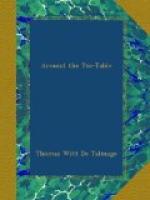Fred Quizzle did not talk until over two years of age, notwithstanding all his parents’ exertions toward getting him to say “papa” and “mamma.” After his parents had made up their minds that he would never talk at all, he one day rose from his block houses, looked into his father’s eyes, and cried out, “How?” as if inquiring in what manner he had found his way into this world. His parent, outraged at the child’s choice of an adverb for his first expression instead of a noun masculine or a noun feminine indicative of filial affection, proceeded to chastise the youngster, when Fred Quizzle cried out for his second, “Why?” as though inquiring the cause of such hasty punishment.
This early propensity for asking questions grew on him till at twenty-three years of age he was a prodigy in this respect. So when we had Governor Wiseman we also had Fred Quizzle, the former to discourse, the latter to start him and keep him going.
Doctor Heavyasbricks was generally present at the same interview. We took the doctor as a sort of sedative. After a season of hard work and nervous excitement, Doctor Heavyasbricks had a quieting influence upon us. There was no lightning in his disposition. He was a great laugher, but never at any recent merriment. It took a long while for him to understand a joke. Indeed, if it were subtle or elaborate, he never understood it. But give the doctor, when in good health, a plain pun or repartee, and let him have a day or two to think over it, and he would come in with uproarious merriment that well-nigh would choke him to death, if the paroxysm happened to take him with his mouth full of muffins.
When at our table, the time not positively occupied in mastication he employed in looking first at Quizzle, the interlocutor, and then at Governor Wiseman, the responding oracle.
Quizzle.—How have you, Governor Wiseman, kept yourself in such robust health so long a time?
Wiseman.—By never trifling with it, sir. I never eat muffins too hot. This one, you see, has had some time to cool. Besides, when I am at all disordered, I immediately send for the doctor.
There are books proposing that we all become our own medical attendant. Whenever we are seized with any sort of physical disorder, we are to take down some volume in homeopathy, allopathy, hydropathy, and running our finger along the index, alight upon the malady that may be afflicting us. We shall find in the same page the name of the disease and the remedy. Thus: chapped hands—glycerine; cold—squills; lumbago—mustard-plasters; nervous excitement—valerian; sleeplessness—Dover’s powders.
This may be very well for slight ailments, but we have attended more funerals of people who were their own doctor than obsequies of any other sort. In your inexperience you will be apt to get the wrong remedy. Look out for the agriculturist who farms by book, neglecting the counsel of his long-experienced neighbors. He will have poor turnips and starveling wheat, and kill his fields with undue apportionments of guano and bonedust. Look out just as much for the patient who in the worship of some “pathy” blindly adheres to a favorite hygienic volume, rejecting in important cases medical admonition.




